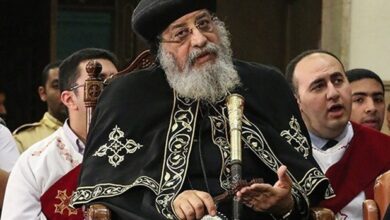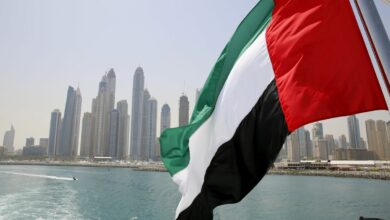Egyptian newspapers on Thursday wrote of a devastated nation marred by mass killing and torture.
For the second consecutive week, Egypt's papers find themselves busy with covering acts of sectarian violence, of which the latest manifestation occurred Tuesday when a Muslim policeman allegedly shot dead a Coptic Christian on a train and wounded five others.
On Wednesday, Father Moussa Rafael, a priest at the Church of St. Mark in Samalout, who has been attending the prosecution's investigations told Al-Masry Al-Youm that injured victim "Marianne Nabil Zaki said to the prosecutor that the gunman moved to and from his train car, checking faces.
"Then he said, 'No God but Allah,' and started shooting at innocent people. He did it on purpose, not randomly. If it is random you would see Muslims on the list of victims," Refael said.
State-run Al-Ahram asserted the opposite on its front page, quoting an eyewitness as saying the policeman did not say a word while shooting the victims. The paper did not mention of Zaki's testimony.
According to Al-Ahram and other newspapers, Amer Ashour Abdel-Zaher, the alleged attacker, confessed to the prosecution office in Samalout that he shot people on the train because he was "depressed."
Al-Ahram dedicated a page to covering the story. The paper quotes from the Minya Governorate that the incident is criminal and not sectarian.
In other news concerning the 1 January Alexandria church bombing that killed 23 people, liberal opposition daily Al-Wafd interviewed the wife of Sayyed Bilal, 31. The Salafi preacher was arrested for possible links to a suicide bombing that rocked the Church of St. Mark and St. Peter in Alexandria and was allegedly tortured to death in a detention center.
His wife, Shiamma Ibrahim, said her late husband does not hate Copts. She added that State Security Investigations (SSI) officers threatened her and her family if she spoke to anyone about her husband’s torture.
On Tuesday, international rights watchdog Amnesty International called on Egyptian authorities to order the police to stop intimidating the family.
Ibrahim claimed that SSI officers offered her hundreds of thousands of pounds, a flat, and a pilgrimage trip to Mecca if she keeps silent about the case.
Al-Wafd also covered the latest Coptic demonstrations in Cairo Wednesday, when hundreds of Copts clashed with police while protesting the train shooting.
The demonstrators "closed the road and threw stones at the police… Four cars and a bus were destroyed," according to the paper.
As for the investigation of the Alex bombing, today's papers gave contradictory coverage. Al-Wafd argued that while darkness shrouds the entire incident, while privately owned Al-Shorouk claimed progress in the investigations.
Al-Wafd claimed that both police and prosecutors investigating the attack have failed to obtain strong evidence proving how the bombing was conducted. They failed also to obtain information about the perpetrator.
In contrast, Al-Shorouk claimed police have narrowed down the suspects to eight people belonging to the Salafi movement in Alexandria.
The suspected Salafis were arrested and are being interrogated by the police.
In other news, Egypt’s Nile Delta Governorate of Sharqiya conducted a funeral for 22 victims, including 14 children who were killed in two road accidents Tuesday.
All together, 32 people died Tuesday and 34 others were injured in two road accidents. In the first crash, four cars and a bus collided head-on with a truck on Cairo Desert Road in Sharqiya and 20 passengers of the bus were killed. The second accident occurred near the city of Belbeis, Sharqiya as a small truck crashed into another truck carrying gas cylinders. The small truck was illegally transporting farm workers, including minors between the ages of 9 and 17 years old.
Al-Ahram featured stories of some of the victims on page 22. One set of parents lost four out of five of its sons and another small family lost a 14-year-old boy whose income served as his family's primary means of support. He had left school to help his family earn a living.
Reckless driving, lax traffic rules and poor road conditions have positioned Egypt as one of the top countries worldwide in terms of traffic accidents. In Egypt, car accidents exceed 30,000 annually. Formal figures estimate that road crashes kill about 8000 people and injure 32,000 others each year here.
Informal figures estimate that around 100,000 people lost their lives in road crashes 1990 and 2008.
Egypt's papers:
Al-Ahram: Daily, state-run, largest distribution in Egypt
Al-Akhbar: Daily, state-run, second to Al-Ahram in institutional size
Al-Gomhorriya: Daily, state-run
Rose al-Youssef: Daily, state-run, close to the National Democratic Party's Policies Secretariat
Al-Dostour: Daily, privately owned
Al-Shorouk: Daily, privately owned
Al-Wafd: Daily, published by the liberal Wafd Party
Al-Arabi: Weekly, published by the Arab Nasserist party
Youm7: Weekly, privately owned
Sawt al-Umma: Weekly, privately owned




